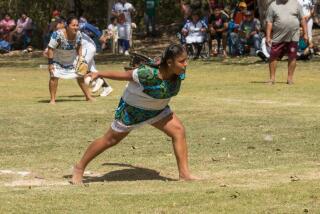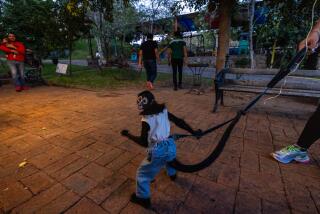Ocon Provides a Novel Form of Relief to Nicaragua : Medicine: Glendale chiropractor serves nine-month volunteer residency in his father’s homeland, furnishing care primarily to athletes.
- Share via
Duane Bickett has made some jarring tackles in seven seasons as a linebacker with the Indianapolis Colts, but it is unlikely any have had a greater impact than one Bickett made during his senior year at Glendale High.
During a practice session that year, Bickett hit teammate Luis Ocon so hard, he knocked him into another career.
“We had a big game that week and everybody was really pumped,” Ocon recalled. “I was the tailback and I went around end, where I was hit hard by a group of our linebackers, including Bickett.”
The result, a fractured vertebra, proved to be a lucky break for Ocon. Although it ended any hopes he had of a football career, it introduced him to a host of rehabilitative therapies he never knew existed.
Ten years later, Dr. Luis Ocon is jarring a few vertebrae of his own as a chiropractor. And while Bickett might have a slightly better chance of getting to the Super Bowl (and we mean slightly; remember, he plays for the Colts), Ocon has come closer to reaching the Olympics.
Ocon recently returned from a nine-month volunteer assignment in Nicaragua, where he worked under the direction of the country’s Ministry of Health and the Nicaraguan Olympic Committee. Originally, Ocon’s residency was to have included a trip to this summer’s Barcelona Games, but when Nicaragua failed to qualify for the baseball competition, the country’s Olympic committee cut back its team to seven athletes and a coach, and Ocon was among those left behind.
But that was just one of many frustrations that Ocon, 28, and Gregory Meissner, a former classmate at Los Angeles’ Cleveland Chiropractic College, learned to accept. There were bureaucracies to negotiate, mounds of paperwork to complete and shortages of everything from medicine to money. They also struggled against ignorance, suspiciousness and indifference.
All things considered, Ocon said, it still “was a great experience.”
“My work there was pretty close to being a social service,” he said. “We had to explain a lot to a lot of people. And once it was explained, they were all enthusiastic.”
Poverty is one thing that does not need to be explained. Unemployment, endemic throughout Central America, is higher than 60% in Nicaragua. And those who do collect a regular paycheck are unable to buy much.
But the daunting conditions convinced Ocon that chiropractic’s holistic approach could be effective in countries such as Nicaragua, where drugs and expensive diagnostic equipment are rarely available.
“Because chiropractic doesn’t use drugs,” Ocon said, “we thought that by educating the people, we’d be able to help them (with) preventive medicine. The hospitals there aren’t prepared for the most basic things. They don’t have the drugs that are needed. That’s why we thought we’d be able to help.”
Ocon’s interest in Nicaragua was sown long before his interest in medicine. His grandfather was a widely feared officer in the security forces of the Somoza family dictatorship. But Luis’ father, Max, emigrated to Los Angeles as a youngster and eventually became a supporter of the Sandinista-led guerrilla movement which, in 1979, toppled the brutal regime his father had helped build.
“We were brought up with the idea of loving, respecting and trying to do what we can for Nicaragua,” Ocon said.
The Ocons also were imbued with a love of sports, a fact that Glendale High opponents in a number of sports have come to regret.
Football Coach Don Shoemaker remembers Luis, the oldest child, as a good athlete and an excellent defensive player. “He was a good hitter,” Shoemaker said. “He was a good player . . . a good, tough kid.”
Lawrence Ocon, Luis’ brother and a two-time All-Pacific League water polo player, still holds the school record for career goals. As a swimmer, he won a bronze medal representing Nicaragua in the 1989 Central American Games. (Although Lawrence was born in Southern California, his father’s nationality made him eligible to swim for Nicaragua in international competition.)
Luzmila Ocon, the family’s youngest sister, contributed to a Glendale High swimming record in a relay before moving on to Valley College, where she advanced to the Western State Conference championships as a freshman. And two of Luis’ nephews, Alberto and Max Ocon, earned All-Southern Section and Times’ All-Glendale honors in football. Both linemen now play at Glendale College.
But athletes are only slightly more plentiful than doctors in the Ocon family. Luis’ cousins, Andres and Martin Arellano, are practicing physicians, and another cousin, Aldo Guerra, is enrolled in medical school. The mix of traditional medicine and chiropractic has led to occasional family feuds, Shoemaker said.
“Every time Max hurt his back, I asked him to go see Uncle Luis and get it adjusted,” he said. “But when Uncle Andres would find out, he would stop him from going.”
Luis found some of the athletes in Nicaragua were dissuaded from coming to see him as well. In fact, of the 12 teams in Nicaragua’s professional baseball league, only one, the Dantos club of Managua, visited on a regular basis.
“The other people were a little bit more closed-minded,” Ocon said. “They practice a lot of folk medicine in Nicaragua.”
The Dantos, who employ a voodoo doctor named Kit Taylor to hex opposing teams, seemed unlikely candidates to upset that trend. But Ocon found a willing volunteer in Franklin Lopez, a powerful first baseman for the Dantos.
“After we (adjusted) him, he would come back after the game saying he felt so good and he played better because of it,” Ocon said. “It was a good feeling to know that you’re helping guys out.”
But Ocon’s biggest success came with pitcher Martin Polanco, who was suffering severe pain in the elbow of his pitching arm. The first time Polanco stopped by the office, he was barely able to raise his arm.
But after several sessions with Ocon and Meissner, Polanco returned in the second half of the season to win five consecutive games and earn a berth on the Nicaraguan national team. Last week, he capped the comeback by striking out eight in seven innings to help beat Team USA, 6-2.
Comeback stories are rare in Nicaraguan baseball, a fact Ocon attributes in part to the outdated methods most athletic trainers continue to employ there.
“Even though the trainers did a lot of things correctly, they were doing a lot of things incorrectly,” he said. “It was almost like old-style training. We saw a lot of overuse injuries, a lot of shoulder problems and arm problems.”
That was one of the reasons Emmett Lang, the president of Nicaragua’s Olympic Committee--and a staunch Dantos fan--invited Ocon and Meissner.
“It’s very important that we get those kinds of doctors here for the athletes,” Lang said. But, Ocon would add, it’s even more important that Nicaragua develop its own staff of specialists.
When Ocon opened the doors to his office in central Managua’s middle-class Bolonia neighborhood, his wallet was full of money and his office was stocked with more than $6,000 in equipment. In an unguarded moment, he would dream of turning the Nicaraguan Olympic team into world beaters and improving the country’s bankrupt health-care system.
Because the Ministry of Health was unable to provide more than a small monthly stipend, Ocon’s father footed most of the bill for his son’s practice. Nevertheless, by the time Luis returned home to Glendale last month, his aborted business was deep in the red. And besides money, he also left behind ultrasound machines, state-of-the-art muscle stimulators and five medical tables.
“Financially, if you want to look at it that way, it was a total loss,” Ocon said.
But he didn’t return empty-handed. In exchange for his time, money and equipment, Nicaragua taught Ocon to appreciate simple truths, such as the one that says massive changes often take place piece by piece. It’s a philosophy he is likely to remember as he and his newlywed wife struggle to build a practice in Southern California.
“It’s a beautiful country,” he said. “I fell in love with Nicaragua. If there was one person that I helped, one person that maybe feels a little better or walks a little straighter because I was there, then it was all worth it.”
More to Read
Go beyond the scoreboard
Get the latest on L.A.'s teams in the daily Sports Report newsletter.
You may occasionally receive promotional content from the Los Angeles Times.







